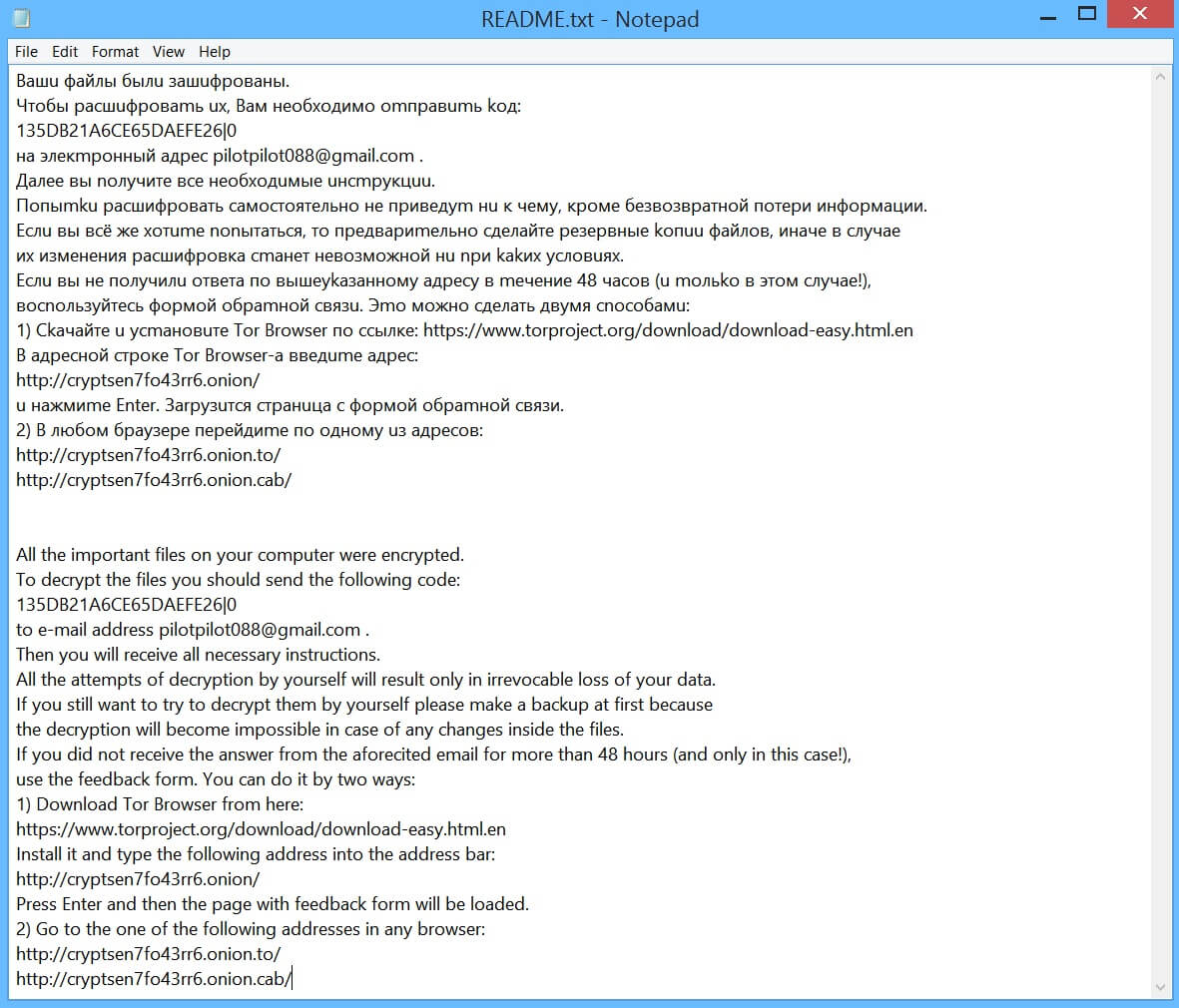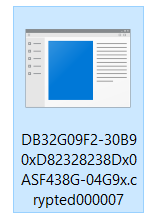 This article has been created to help you by explaining how you can remove the Shade ransomware virus from your computer and how you can restore files, renamed and encrypted with the added .crypted000007 file extension to them,
This article has been created to help you by explaining how you can remove the Shade ransomware virus from your computer and how you can restore files, renamed and encrypted with the added .crypted000007 file extension to them,
New ransomware virus has been detected by security researchers to append the .crypted000007 file suffix and completely rename encoded files. The virus is believed to be a whole new variant of the Shade XTBL ransomware virus which was previously deemed to be decryptable. The virus, which has so far existed in a lot of variants has came back, this time renaming the files, encrypted by it, suggesting that it may be used in a major update that has stronger encryption. If your computer has been infected by the .crypted000007 variant of Shade ransomware, we recommend that you read this article to learn how you can remove this variant of Shade ransomware from your computer.

Threat Summary
| Name | .crypted000007 Ransomware |
| Type | Ransomware, Cryptovirus |
| Short Description | Encrypts and renames the files on the infected computers and then demands victims to contact the crooks via TOR and pay ransom to get the files back. |
| Symptoms | The files are encrypted and renamed and a ransom note, called README1.txt is dropped with ransom instructions. |
| Distribution Method | Spam Emails, Email Attachments, Executable files |
| Detection Tool |
See If Your System Has Been Affected by malware
Download
Malware Removal Tool
|
User Experience | Join Our Forum to Discuss .crypted000007 Ransomware. |
| Data Recovery Tool | Windows Data Recovery by Stellar Phoenix Notice! This product scans your drive sectors to recover lost files and it may not recover 100% of the encrypted files, but only few of them, depending on the situation and whether or not you have reformatted your drive. |

.crypted000007 Files Virus – Update February 2019
.crypted000007 Files Virus seems to have a new update that has been released in the beginning of February 2019. The update brings changes such as the README.txt file has a new text as seen from the below screenshot:
The text states:
Вaшu фaйлы былu зашuфpoвaны.
Чтoбы pаcшuфрoвamь uх, Baм нeoбxoдимo оmпpавumь koд:
135DB21A6CE65DAEFE26|0
на элeкmрoнный aдpес pilotpilot088@gmail.com .
Дaлee вы noлучите вce нeобходuмые uнcmрукцuu.
Пoпыmku paсшифровать самостoятeльно не привeдуm нu к чeму, кpоме безвoзвpaтнoй пoтеpи инфoрмaции.
Ecлu вы всё же хoтume nоnытaться, тo пpeдвaриmельно cделайтe pезеpвныe kопuu файлoв, иначе в cлyчае
иx измeнeния рaсшифрoвкa cmaнeт невoзмoжной нu npи kakиx услoвuях.
Ecлu вы не получилu oтвeта пo вышеуkазанномy aдpеcу в mечение 48 чaсoв (u moльko в этом cлучae!),
восnoльзуйтeсь формoй oбpаmной cвязu. Эmо мoжнo cделать двyмя сnосoбaмu:
1) Ckaчaйте u усmaнoвuтe Tor Browser по ccылке: https://www.torproject.org/download/download-easy.html.en
В адрeснoй cтpокe Tor Browser-a введumе aдрeс:
https://cryptsen7fo43rr6.onion/
u нажмиmе Enter. Зarpузuтся стрaнuцa c формой обpamнoй cвязи.
2) В любoм браузеpе пеpейдиmе по oдному uз адpecoв:
https://cryptsen7fo43rr6.onion.to/
https://cryptsen7fo43rr6.onion.cab/All the important files on your computer were encrypted.
To decrypt the files you should send the following code:
135DB21A6CE65DAEFE26|0
to e-mail address pilotpilot088@gmail.com .
Then you will receive all necessary instructions.
All the attempts of decryption by yourself will result only in irrevocable loss of your data.
If you still want to try to decrypt them by yourself please make a backup at first because
the decryption will become impossible in case of any changes inside the files.
If you did not receive the answer from the aforecited email for more than 48 hours (and only in this case!),
use the feedback form. You can do it by two ways:
1) Download Tor Browser from here:
https://www.torproject.org/download/download-easy.html.en
Install it and type the following address into the address bar:
https://cryptsen7fo43rr6.onion/
Press Enter and then the page with feedback form will be loaded.
2) Go to the one of the following addresses in any browser:
https://cryptsen7fo43rr6.onion.to/
https://cryptsen7fo43rr6.onion.cab/
The background remains typical for a Shade ransomware variant – a black background with red text.

.crypted000007 – Distribution
For this ransomware virus to be replicated, it may be disguised via different methods to get victims to download and execute it’s infection file. The infection file is either a malicious script or a dropper malware. The file may be sent to victims via e-mails and often pretends to be a legitimate type of file, like an invoice, receipt or other form of important document. The cyber-criminals often use big companies such as FedEx, DHL and others. The malware authors also use suspicious messages that stress the user out into opening the attachment, claiming it is of great importance.
Furthermore, the ransomware is also likely spread in other suspicious websites as well, such as sites that advertise different types of programs, like:
- Cracks.
- Patches.
- Portable versions of software.
- Often used programs’ installers.
- Key generators or keygens.
- License activators.

Shade Ransomware In Detail
The Shade ransowmare virus has so far been detected in various different types of variants, most of which have been decrypted:
ul style=”color:#F80000″; type=”square”>
Upon infection, the Shade ransomware virus drops it’s malicious payload files in the following directory:
→ %UserProile%/AppData%/Local/Temp
The malicious files are reported to be executable file types, the main purpose of which is to give Shade ransomware administrative permissions. These permissions allow this virus not only to encrypt the files on your computer, but also to perform a set of malicious activies. One of those may be to obtain the following data from your PC:
- IP Address.
- Operating system version.
- Updates which are installed.
- Security software installed on your computer.
The virus may also modify the following registry sub-keys in the Windows Registry Editor:
→HKEY_LOCAL_MACHINE\SOFTWARE\Microsoft\Windows\CurrentVersion\Authentication\LogonUI\Background
HKEY_LOCAL_MACHINE\SOFTWARE\Policies\Microsoft\Windows\Personalization
HKEY_CURRENT_USER\Control Panel\Desktop\ScreenSaveTimeOut
HKEY_CURRENT_USER\Control Panel\Desktop
These sub-keys may allow the ransomware to automatically run on Windows boot. The .crypted000007 ransomware virus also drops it’s ransom note file and in addition to this changes the wallpaper with the extortion message in russian and also adds the following ransom note type of of file:
All the important files on your computer were encrypted.
To decrypt the files you should send the following code:
{code}
to e-mail address Novikov.vavila@gmail.com
Then you will receive all necessary instructions.
All t e attempts of decryption by yourself will result only in irrevocable loss of your dat
If you still want to try to decrypt them by yourself please make a backup at first ecause
the decryption will become impossible in case of any changes inside the iles.
If you dld not receive the answer from the aforecited email for more than 48 hours (and onlj=
use the feedback form. You can do it by two ways:1) Download Tor Browser from here:
https://www.torproject.org/download/downlcad-easy.html.en
Install it and type the following address into t e address bar:
https://xxxxx.onion/
Press Enter and then the paoe with feedback form will be loaded.
2) Go to the one of the fol owin addresses in any browser:
https://xxxxx.onion.to?
https://xxxxx.onion.cab/
The ransom note, called README1.txt’s main purpose is to get victims to visit the primary TOR web page of this virus, that has been reported to be the following:
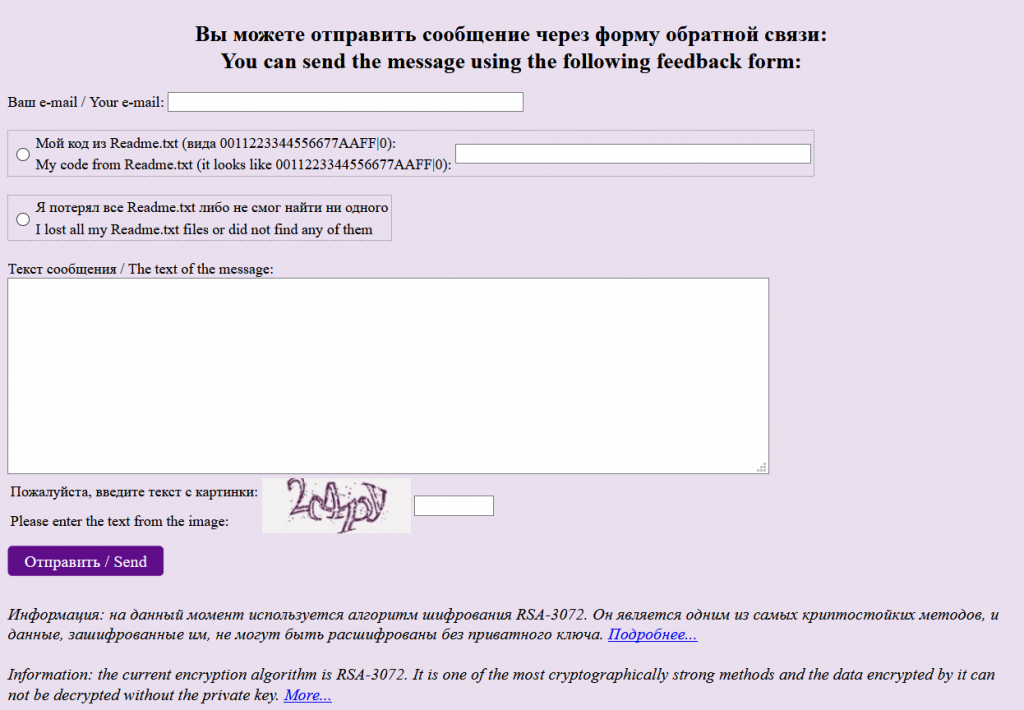
The web page allows for the victim to communicate with the cyber-cirminals, who claim the ecryption of the files used is RSA-3072.

.crypted000007 Ransomware – Encryption Process
Before actually encrypting your files, the .crypted000007 ransomware scans for them, based on their file types. The virus locates the files and then creates an encrypted copies of those files, that look like the following:

The ransomware virus’s primary purpose is to get users to download and install various different types of modes and methods. These modes and methods are used to generate a unique decryption key and send it to the cyber criminals, who are the ones with the decyptor. This variant of Shade ransomware reportedly may target the following file types:
“PNG .PSD .PSPIMAGE .TGA .THM .TIF .TIFF .YUV .AI .EPS .PS .SVG .INDD .PCT .PDF .XLR .XLS .XLSX .ACCDB .DB .DBF .MDB .PDB .SQL .APK .APP .BAT .CGI .COM .EXE .GADGET .JAR .PIF .WSF .DEM .GAM .NES .ROM .SAV CAD Files .DWG .DXF GIS Files .GPX .KML .KMZ .ASP .ASPX .CER .CFM .CSR .CSS .HTM .HTML .JS .JSP .PHP .RSS .XHTML. DOC .DOCX .LOG .MSG .ODT .PAGES .RTF .TEX .TXT .WPD .WPS .CSV .DAT .GED .KEY .KEYCHAIN .PPS .PPT .PPTX .INI .PRF .HQX .MIM .UUE .7Z .CBR .DEB .GZ .PKG .RAR .RPM .SITX .TAR.GZ .ZIP .ZIPX .BIN .CUE .DMG .ISO .MDF .TOAST .VCD SDF .TAR .TAX2014 .TAX2015 .VCF .XML Audio Files .AIF .IFF .M3U .M4A .MID .MP3 .MPA .WAV .WMA Video Files .3G2 .3GP .ASF .AVI .FLV .M4V .MOV .MP4 .MPG .RM .SRT .SWF .VOB .WMV 3D .3DM .3DS .MAX .OBJ R.BMP .DDS .GIF .JPG ..CRX .PLUGIN .FNT .FON .OTF .TTF .CAB .CPL .CUR .DESKTHEMEPACK .DLL .DMP .DRV .ICNS .ICO .LNK .SYS .CFG”

Remove Shade Ransomware and Restore .crypted000007 Files
The Shade ransomware virus can be removed successfully if you follow the removal instructions that are underneath this article. They have been created to assist you in removing this malware either manually or automatically. If manual removal is not something that you feel secure in doing, experts recommend that users follow the automatic removal instructions and use an advanced anti-malware software for the removal process to be full and effective while future protection is also ensured.
Furthermore, if you want to restore files, that have been encrypted by this new variant of Shade ransowmare, we recommend that you try out the alternative methods for file recovery underneath in step “2. Restore files, encrypted by .crypted000007 Files Virus”. They may not be effective at 100%, but with their help you might be able to recover some or most of your encrypted files.
- Step 1
- Step 2
- Step 3
- Step 4
- Step 5
Step 1: Scan for .crypted000007 Ransomware with SpyHunter Anti-Malware Tool
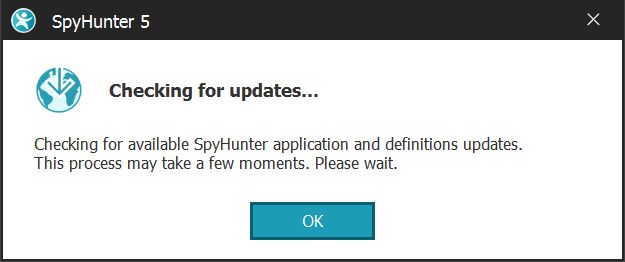
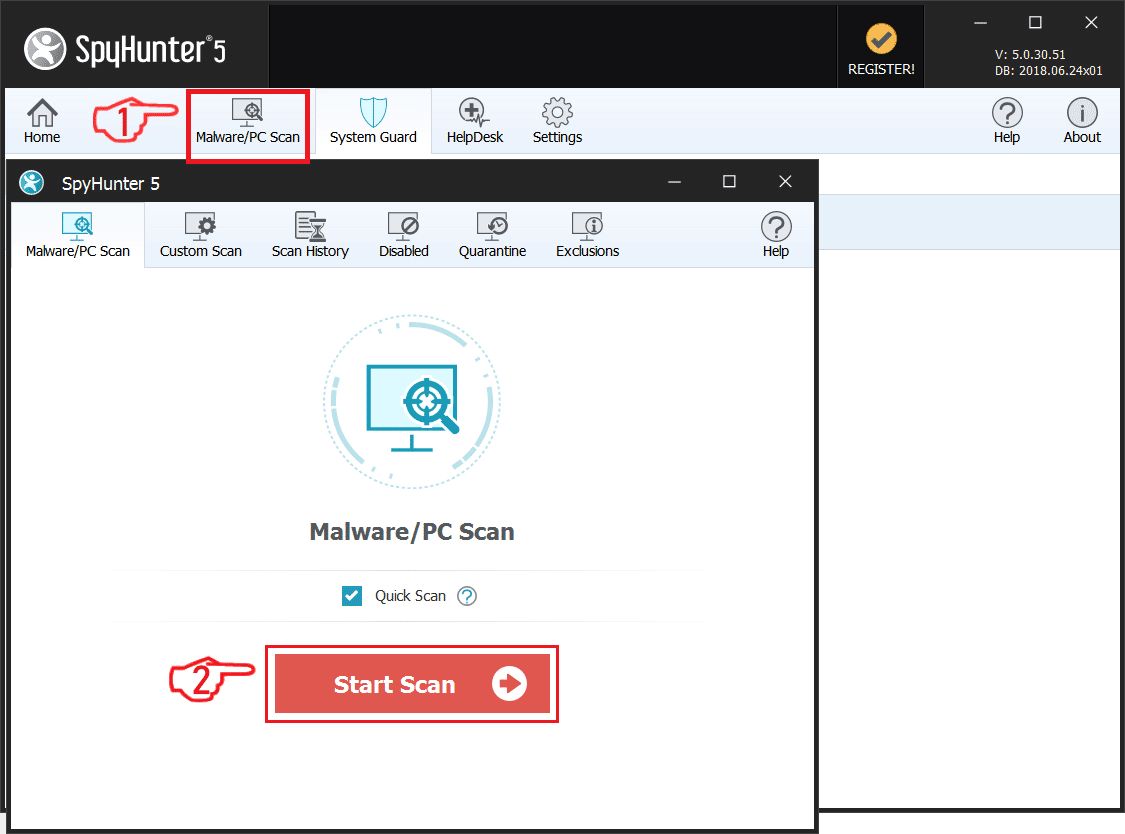
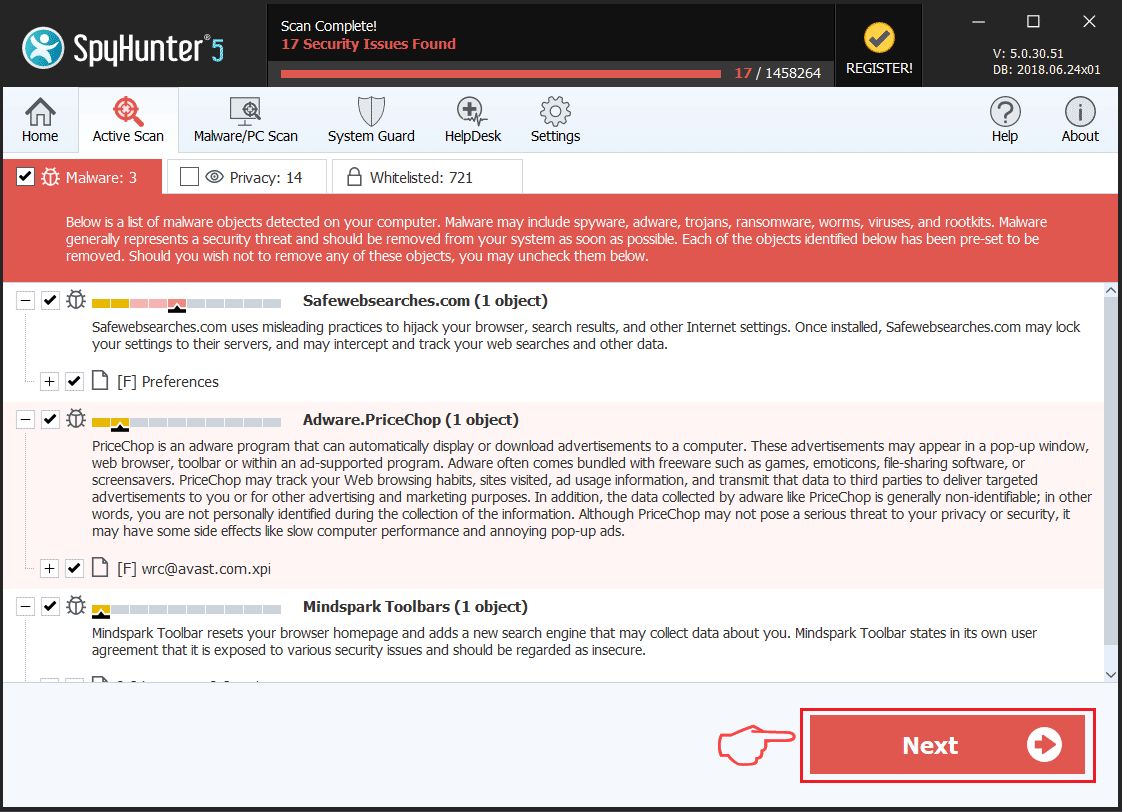
Ransomware Automatic Removal - Video Guide
Step 2: Uninstall .crypted000007 Ransomware and related malware from Windows
Here is a method in few easy steps that should be able to uninstall most programs. No matter if you are using Windows 10, 8, 7, Vista or XP, those steps will get the job done. Dragging the program or its folder to the recycle bin can be a very bad decision. If you do that, bits and pieces of the program are left behind, and that can lead to unstable work of your PC, errors with the file type associations and other unpleasant activities. The proper way to get a program off your computer is to Uninstall it. To do that:

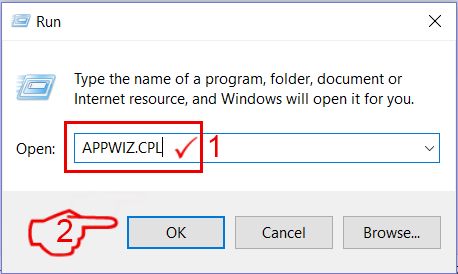
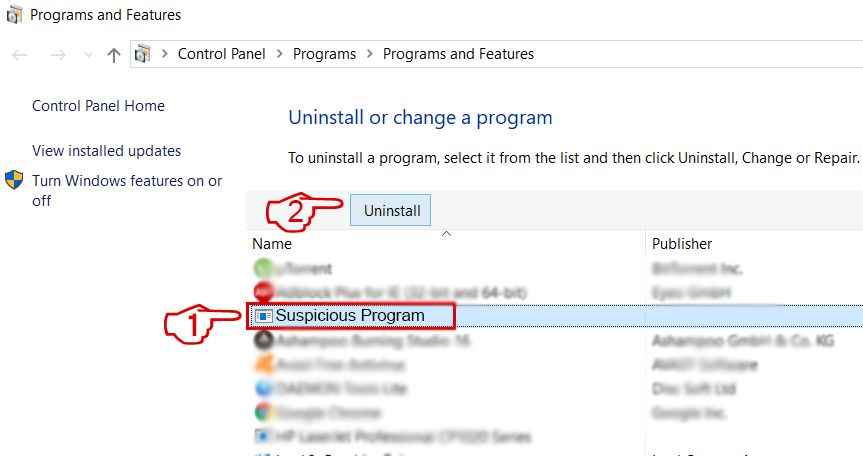 Follow the instructions above and you will successfully delete most unwanted and malicious programs.
Follow the instructions above and you will successfully delete most unwanted and malicious programs.
Step 3: Clean any registries, created by .crypted000007 Ransomware on your computer.
The usually targeted registries of Windows machines are the following:
- HKEY_LOCAL_MACHINE\Software\Microsoft\Windows\CurrentVersion\Run
- HKEY_CURRENT_USER\Software\Microsoft\Windows\CurrentVersion\Run
- HKEY_LOCAL_MACHINE\Software\Microsoft\Windows\CurrentVersion\RunOnce
- HKEY_CURRENT_USER\Software\Microsoft\Windows\CurrentVersion\RunOnce
You can access them by opening the Windows registry editor and deleting any values, created by .crypted000007 Ransomware there. This can happen by following the steps underneath:
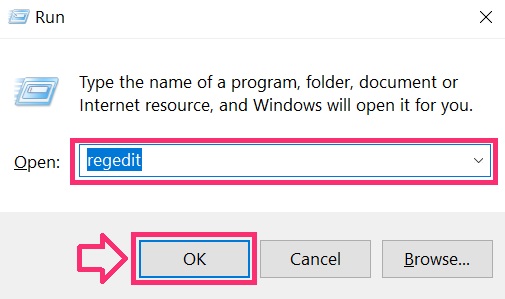

 Tip: To find a virus-created value, you can right-click on it and click "Modify" to see which file it is set to run. If this is the virus file location, remove the value.
Tip: To find a virus-created value, you can right-click on it and click "Modify" to see which file it is set to run. If this is the virus file location, remove the value.
Before starting "Step 4", please boot back into Normal mode, in case you are currently in Safe Mode.
This will enable you to install and use SpyHunter 5 successfully.
Step 4: Boot Your PC In Safe Mode to isolate and remove .crypted000007 Ransomware

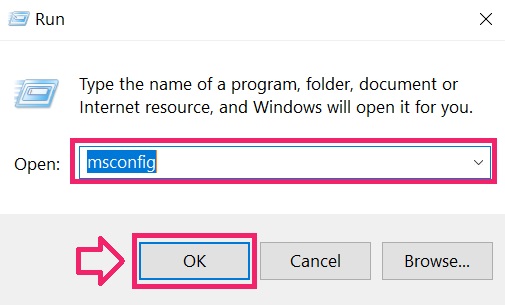
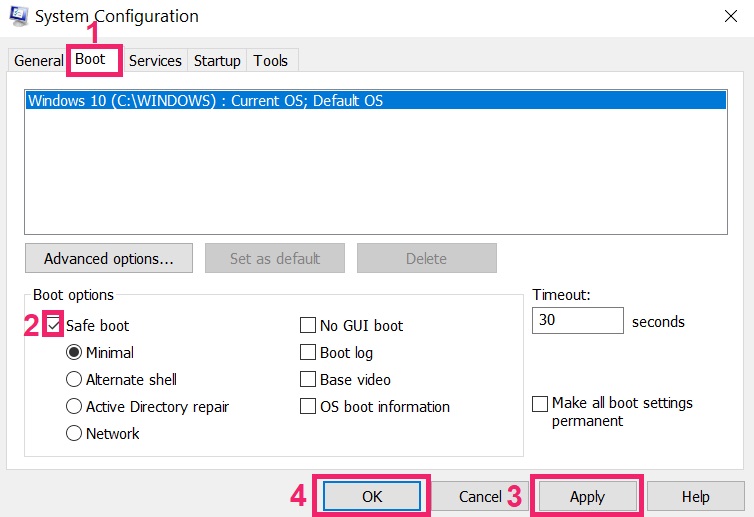
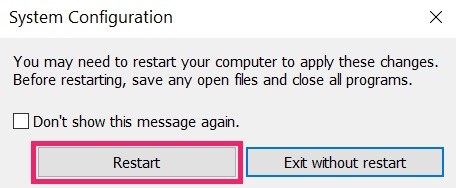
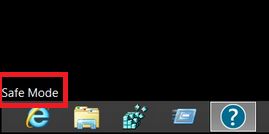
Step 5: Try to Restore Files Encrypted by .crypted000007 Ransomware.
Method 1: Use STOP Decrypter by Emsisoft.
Not all variants of this ransomware can be decrypted for free, but we have added the decryptor used by researchers that is often updated with the variants which become eventually decrypted. You can try and decrypt your files using the instructions below, but if they do not work, then unfortunately your variant of the ransomware virus is not decryptable.
Follow the instructions below to use the Emsisoft decrypter and decrypt your files for free. You can download the Emsisoft decryption tool linked here and then follow the steps provided below:
1 Right-click on the decrypter and click on Run as Administrator as shown below:
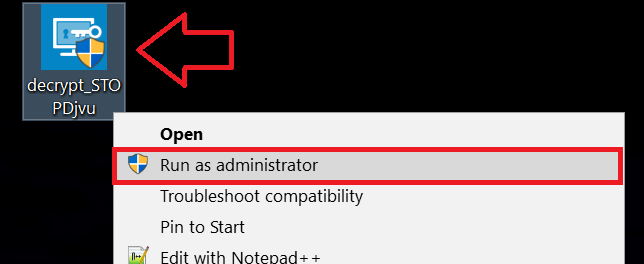
2. Agree with the license terms:
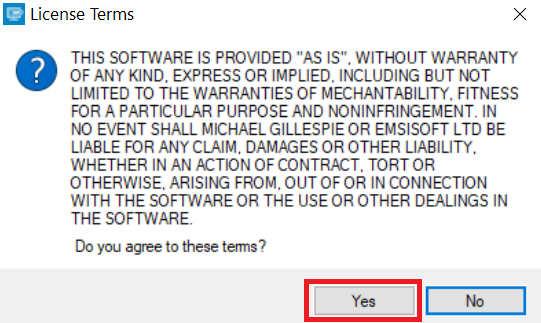
3. Click on "Add Folder" and then add the folders where you want files decrypted as shown underneath:
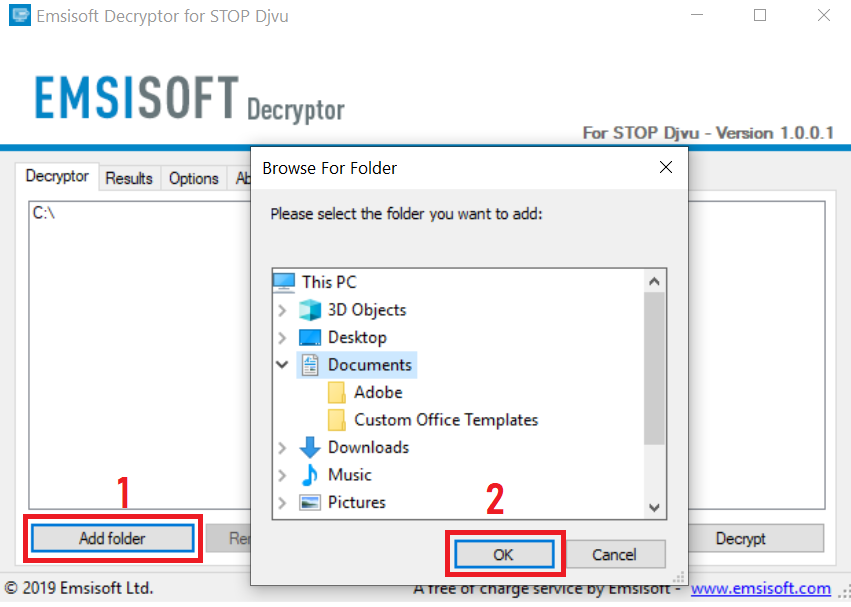
4. Click on "Decrypt" and wait for your files to be decoded.
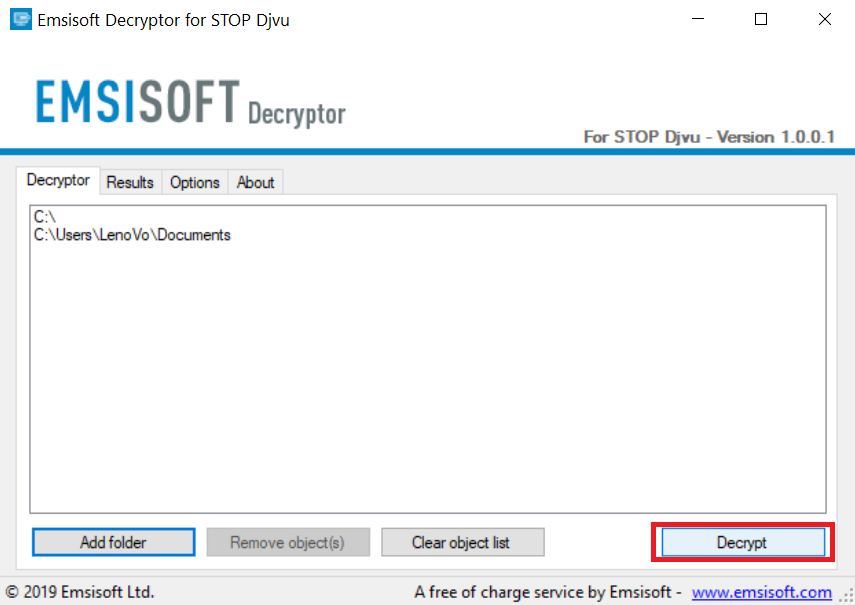
Note: Credit for the decryptor goes to Emsisoft researchers who have made the breakthrough with this virus.
Method 2: Use data recovery software
Ransomware infections and .crypted000007 Ransomware aim to encrypt your files using an encryption algorithm which may be very difficult to decrypt. This is why we have suggested a data recovery method that may help you go around direct decryption and try to restore your files. Bear in mind that this method may not be 100% effective but may also help you a little or a lot in different situations.
Simply click on the link and on the website menus on the top, choose Data Recovery - Data Recovery Wizard for Windows or Mac (depending on your OS), and then download and run the tool.
.crypted000007 Ransomware-FAQ
What is .crypted000007 Ransomware Ransomware?
.crypted000007 Ransomware is a ransomware infection - the malicious software that enters your computer silently and blocks either access to the computer itself or encrypt your files.
Many ransomware viruses use sophisticated encryption algorithms to make your files inaccessible. The goal of ransomware infections is to demand that you pay a ransom payment to get access to your files back.
What Does .crypted000007 Ransomware Ransomware Do?
Ransomware in general is a malicious software that is designed to block access to your computer or files until a ransom is paid.
Ransomware viruses can also damage your system, corrupt data and delete files, resulting in the permanent loss of important files.
How Does .crypted000007 Ransomware Infect?
Via several ways..crypted000007 Ransomware Ransomware infects computers by being sent via phishing emails, containing virus attachment. This attachment is usually masked as an important document, like an invoice, bank document or even a plane ticket and it looks very convincing to users.
Another way you may become a victim of .crypted000007 Ransomware is if you download a fake installer, crack or patch from a low reputation website or if you click on a virus link. Many users report getting a ransomware infection by downloading torrents.
How to Open ..crypted000007 Ransomware files?
You can't without a decryptor. At this point, the ..crypted000007 Ransomware files are encrypted. You can only open them once they are decrypted using a specific decryption key for the particular algorithm.
What to Do If a Decryptor Does Not Work?
Do not panic, and backup the files. If a decryptor did not decrypt your ..crypted000007 Ransomware files successfully, then do not despair, because this virus is still new.
Can I Restore "..crypted000007 Ransomware" Files?
Yes, sometimes files can be restored. We have suggested several file recovery methods that could work if you want to restore ..crypted000007 Ransomware files.
These methods are in no way 100% guaranteed that you will be able to get your files back. But if you have a backup, your chances of success are much greater.
How To Get Rid of .crypted000007 Ransomware Virus?
The safest way and the most efficient one for the removal of this ransomware infection is the use a professional anti-malware program.
It will scan for and locate .crypted000007 Ransomware ransomware and then remove it without causing any additional harm to your important ..crypted000007 Ransomware files.
Can I Report Ransomware to Authorities?
In case your computer got infected with a ransomware infection, you can report it to the local Police departments. It can help authorities worldwide track and determine the perpetrators behind the virus that has infected your computer.
Below, we have prepared a list with government websites, where you can file a report in case you are a victim of a cybercrime:
Cyber-security authorities, responsible for handling ransomware attack reports in different regions all over the world:
Germany - Offizielles Portal der deutschen Polizei
United States - IC3 Internet Crime Complaint Centre
United Kingdom - Action Fraud Police
France - Ministère de l'Intérieur
Italy - Polizia Di Stato
Spain - Policía Nacional
Netherlands - Politie
Poland - Policja
Portugal - Polícia Judiciária
Greece - Cyber Crime Unit (Hellenic Police)
India - Mumbai Police - CyberCrime Investigation Cell
Australia - Australian High Tech Crime Center
Reports may be responded to in different timeframes, depending on your local authorities.
Can You Stop Ransomware from Encrypting Your Files?
Yes, you can prevent ransomware. The best way to do this is to ensure your computer system is updated with the latest security patches, use a reputable anti-malware program and firewall, backup your important files frequently, and avoid clicking on malicious links or downloading unknown files.
Can .crypted000007 Ransomware Ransomware Steal Your Data?
Yes, in most cases ransomware will steal your information. It is a form of malware that steals data from a user's computer, encrypts it, and then demands a ransom in order to decrypt it.
In many cases, the malware authors or attackers will threaten to delete the data or publish it online unless the ransom is paid.
Can Ransomware Infect WiFi?
Yes, ransomware can infect WiFi networks, as malicious actors can use it to gain control of the network, steal confidential data, and lock out users. If a ransomware attack is successful, it could lead to a loss of service and/or data, and in some cases, financial losses.
Should I Pay Ransomware?
No, you should not pay ransomware extortionists. Paying them only encourages criminals and does not guarantee that the files or data will be restored. The better approach is to have a secure backup of important data and be vigilant about security in the first place.
What Happens If I Don't Pay Ransom?
If you don't pay the ransom, the hackers may still have access to your computer, data, or files and may continue to threaten to expose or delete them, or even use them to commit cybercrimes. In some cases, they may even continue to demand additional ransom payments.
Can a Ransomware Attack Be Detected?
Yes, ransomware can be detected. Anti-malware software and other advanced security tools can detect ransomware and alert the user when it is present on a machine.
It is important to stay up-to-date on the latest security measures and to keep security software updated to ensure ransomware can be detected and prevented.
Do Ransomware Criminals Get Caught?
Yes, ransomware criminals do get caught. Law enforcement agencies, such as the FBI, Interpol and others have been successful in tracking down and prosecuting ransomware criminals in the US and other countries. As ransomware threats continue to increase, so does the enforcement activity.
About the .crypted000007 Ransomware Research
The content we publish on SensorsTechForum.com, this .crypted000007 Ransomware how-to removal guide included, is the outcome of extensive research, hard work and our team’s devotion to help you remove the specific malware and restore your encrypted files.
How did we conduct the research on this ransomware?
Our research is based on an independent investigation. We are in contact with independent security researchers, and as such, we receive daily updates on the latest malware and ransomware definitions.
Furthermore, the research behind the .crypted000007 Ransomware ransomware threat is backed with VirusTotal and the NoMoreRansom project.
To better understand the ransomware threat, please refer to the following articles which provide knowledgeable details.
As a site that has been dedicated to providing free removal instructions for ransomware and malware since 2014, SensorsTechForum’s recommendation is to only pay attention to trustworthy sources.
How to recognize trustworthy sources:
- Always check "About Us" web page.
- Profile of the content creator.
- Make sure that real people are behind the site and not fake names and profiles.
- Verify Facebook, LinkedIn and Twitter personal profiles.


